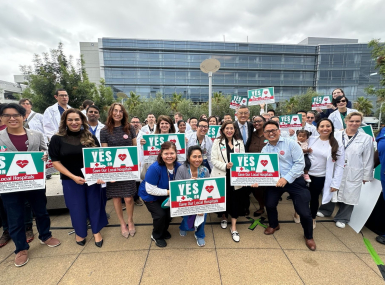Problem:
|
Too many residents face food insecurity and lack the knowledge to live healthy.
|
Solution:
|
Create a program to put fresh produce in the hands of the residents who need it most, teach them how to live a healthy lifestyle and foster a healthy community.
|
For one doctor in California, the old ways of providing healthcare could not keep up to the communities needs in 2021.
His solution? Throw out the script and radically rewrite a coordinated approach tackling preventative care through nutrition and behavior.
Recipe4Health (R4H) is a program he created in partnership with ALL IN Alameda County and many other organizations to tackle food insecurity, behavioral struggles and medicine all in one.
Healthy food interventions
“Food as medicine” is a phrase used by Dr. Steven Chen to describe his innovative program.
Instead of tackling health through separate industries working independently, R4H focuses on crafting a cooperative system through the Food Farmacy, the Behavioral Pharmacy and provider trainings.
People who are food insecure have a drastically higher rate of illness than those who are food secure. Food security means “access by all people at all times to enough food for an active, healthy life,” according to the U.S. Department of Agriculture.
Being food insecure can lead to chronic illness, behavioral issues, and medical conditions like diabetes.
During COVID, the rate of food insecurity in the country doubled to about 23 percent of the population. Chen said it is not enough to “roll a food bank into your clinic” to tackle food insecurity. Access to quality food alone is not enough, he noted. Providers must be trained on how to use food as medicine.
Many patients may be fine with increased access to quality food, but others may need more support through nutritional advice or behavioral support, he said, adding that the “how” is missing from the current healthcare model.
Chen describes his model as a sandwich — the protein of the sandwich being the clinic with trained professionals who understand food as medicine, while the top bun is the nutrient-rich food provided by the Food Farmacy and the bottom bun is the Behavioral Pharmacy, providing additional community support for those in need.
Together, the program treats many of the critical aspects of health necessary for a healthy individual and a healthy community.
The Food Farmacy focuses on putting nutrient-rich foods in the hands of those who need it most.
To do so, the Farmacy grows organic foods regeneratively. Regenerative practices focus on the health of the produce and the soil, ensuring the soil is not stripped of its nutrients. The Alameda-based Dig Deep Farms does not use pesticides and creates a community of “farmacists” to help produce and deliver foods across the county.
To further support the community, the Food Farmacy provides training and jobs for the recently incarcerated, helping reduce recidivism by providing a career path and a way to make a difference improving the community.
Community is medicine
The Behavioral Pharmacy offers cooking classes, information on how to stay active, connecting with others and much more.
The non-profit organization Open Source Wellness, which runs the Behavioral Pharmacy, promotes four key ideals: Exercise more, eat better, reduce your stress and gain social support. The Behavioral Pharmacy is not a place to prescribe a solution, but a community where they show residents how to live better through shared experiences.
R4H includes a training program to teach clinicians how to use food as medicine, to understand the shift in mindset toward preventative care as well as pharmaceutical care. The program is an eight-hour course featuring a chef and Chen, who aim to teach clinicians, nutritionists and others how to quickly make recommendations on food insecurity. The goal is to have doctors make recommendations during a typical 15-minute meeting with a patient.
In Alameda County, the food insecure can get access to quality, nutrient-rich vegetables for 16 weeks delivered directly to their door. Residents can attend the behavioral pharmacy once a week to work on skills, movement and connection.
ALL IN is a funding partner program, championed by the late Supervisor Wilma Chan of Alameda County to help organizations fight a war on poverty.
To date, the program has helped 1,691 residents with food insecurity. Food insecurity is not often treated by traditional medicine. “Most healthcare people aren’t thinking ‘food,’” Chen said.
He hopes to see doctors around the country screen for food security and make use of this integrated treatment model.




